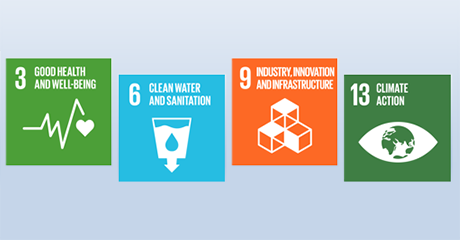This section describes material risks identified by the Kyowa Kirin Group as of December 31, 2023. The Group defines risks as factors that could have an uncertain impact on business targets, including both threats and opportunities.
However, the Group may face other unforeseen risks caused by changes in internal and external conditions. In addition, the domestic and overseas pharmaceutical industry faces a number of other risks to its business activities. These include, but are not limited to, risks related to intellectual property rights, risks related to product side-effects, risks related to legal disputes, risks related to competition and patent expiry, risks related to fluctuations in fuel costs, risks related to fluctuations in exchange rates and financial markets, and country risk, which could all have a negative impact on the Group’s business performance and financial position.
Details of risks and expected main impacts
The Group is working to maximize the value of two and other drugs that have been positioned as global strategic products – Crysvita, a treatment for X-linked hypophosphatemia and Poteligeo, an anticancer agent. We launched our own marketing for Crysvita in North America in April 2023. However, we need to continue monitoring whether we can increase sales and profit through market expansion. Moreover, regarding risks of global strategic products as a whole, the following risks may prevent the Group from attaining its business targets: delays to sales area expansion caused by setbacks in market launch preparations; slow progress with market penetration due to difficulties in identifying potential patients; sharply lower-than-expected sales due to a shortfall in projected product prices in new markets; and impediments to stable supplies caused by quality issues, manufacturing problems and other issues.
Key mitigation measures
In preparation for maximizing the value of global strategic products, we are moving forward with measures for penetrating markets and expanding our business regions, centered on Europe and the U.S. In addition to a global management system that facilitates seamless cooperation between functions (divisions) and regions (affiliates) on a global level, the Group has appointed personnel to take responsibility for each global strategic product. This person leads a cross-function/region team that works together to draft and execute strategies to maximize the value of each product. We have started our own marketing of Crysvita in North America where we are well-prepared and continue to identify patients who require treatment, enhance communication with them, monitor field activities, and increase the level of field teams engaged in such activities. Regarding issues with quality and manufacturing, key mitigation measures are outlined in the “Risks related to product quality” and “Risks related to production and stable supply.”
Details of risks and expected main impacts
In its R&D, the Group pursues the ongoing creation of groundbreaking pharmaceutical products and has established the following strategies centered on technology, disease, and open innovation.
(i) In addition to its ongoing quest to drive advances in antibody technology, the Group will build a platform for creating breakthrough drugs by making full use of diverse modalities.
(ii) The Group will continue to provide “Only-one value drugs” to address diseases that currently have no effective treatment while taking advantage of disease science that generated global strategic products such as Crysvita and Poteligeo to date.
(iii) The Group will continue to proactively incorporate external innovation through advanced open innovation activities, fusing collaborative research activities with academia, startups, and other partners (information gathering in the San Diego area, etc.) with early access to information by means of venture capital fund investments.
However, in the process of developing new drugs over long periods of time, there may be cases where R&D has to be abandoned; for example, if expected efficacy is not confirmed or for safety and other reasons, which may prevent the Group from expanding its drug pipeline, undermining growth potential and profitability.
Key mitigation measures
The Group is actively stepping up investments in R&D (aiming for an R&D expense ratio of 18–20%) to strengthen the pipeline of new drugs that will lead the next generation, such as global candidates. To complement proprietary research, the Group is also focusing on open innovation activities involving partners from across industry, government, and academia, including active strategic partnering (in-licensing, tie-ups, etc.) to acquire platform technologies and pipeline assets. For instance, since 2018, the Group has been extending its R&D alliance with InveniAI LLC of the United States providing AI and machine learning applications, identifying, assessing, and optimizing novel drug discovery targets that complement the Group’s proprietary next-generation antibody technology. In addition, the Group is promoting digital transformation of R&D alliance by accessing the AI technology platform owned by InveniAI. Moreover, through investing in a venture capital fund, in 2022 the Group entered into a research collaboration with LUCA Science Inc., which has a proprietary technology to isolate high functional mitochondria. The collaboration allows for the Group to create innovative therapeutic options based on mitochondrial drug discovery. To further strengthen access to cutting-edge drug discovery technology owned by academia, the Group has started an organizational alliance with School of Life Science and Technology, Tokyo Institute of Technology this year for the development of drug discovery technology. In addition, to take in innovation on a global basis, the Company continues to strengthen alliance with La Jolla Institute for Immunology, a world-leading research institute, through Kyowa Kirin North America’s research institute, and promote CVC (Corporate Venture Capital) activities. In October 2023, the Company entered into an acquisition agreement with England-based Orchard Therapeutics plc, specializing in hematopoietic stem cell gene therapy. Through the acquisition, we will significantly strengthen our research and development capability for continuing to create life-changing value by combining our drug discovery technology and experience with its hematopoietic stem cell gene therapy technology.
Details of risks and expected main impacts
The trend toward tighter control of healthcare costs is increasing in Japan and elsewhere. Efforts to reform healthcare systems in various countries involve reducing prices of drugs and encouraging wider use of generic drugs. These trends may have a negative impact on the Group’s business performance and financial position. In this context, while being innovative and also adequate for unmet medical needs is important to the successful reception from stakeholders, delays to the development of further practical, groundbreaking new drugs may undermine the Group’s growth potential and profitability
Key mitigation measures
The Group closely monitors healthcare policy trends in each country, while also strategically examining measures to evaluate the value of its life-changing pharmaceuticals from various aspects so as to securely deliver them to patients. Furthermore, in price setting, the Group considers the impact on its business so that it can secure appropriate revenues to continuously creating innovative drugs, while complying with each country’s systems.
Details of risks and expected main impacts
To achieve its management goals as a Japan-based global pharmaceutical company, in accordance with the Basic Policy on the Internal Control System, the Group has been working to enhance its governance by establishing an appropriate system to secure its compliance, risk management, and the appropriateness of financial reports, as well as reporting their operations to the Board of Directors. In the event that these measures are not fully effective, emerging risks could result in restrictions or suspensions of production, sales and other business activities, and the loss of trust as a pharmaceutical company.
Key mitigation measures
Risk management aims to achieve group-wide risk management that can anticipate the future and take preventative measures. To this end, the Group has introduced an IT tool to uniformly manage group-wide risks, and stages ongoing crisis and BCP drills not only linking its head office with each region but also across regions in Japan and overseas, and deliberates on material issues (materiality) that are both risks the Group needs to address over the medium- to longterm as well as opportunities. Through these actions, the Group is working to heighten its ability to respond to new and potential risks. Principal risks of the Group as well as regions are monitored by the Group’s CSR Committee and each region’s CSR Committee and their details are reported to the respective board of directors. Furthermore, the Group conforms to the three-line model advocated by the Institute of Internal Auditors, and has secured a system to make appropriate responses to risks.
Compliance is provided in “Risks related to compliance” and the appropriateness of financial reports is in “IV. Information about Reporting Company, 4 Corporate governance” respectively.
Details of risks and expected main impacts
Pharmaceutical manufacturing requires facilities (hard assets) and procedures and people (soft assets) that are compatible with good manufacturing practice (GMP). Should a GMP inspection by a national authority or an internal audit find a serious GMP issue, the regulatory authority may issue instructions for production or shipments to be suspended. In addition, if for any reason there are any concerns about the safety or quality of a product with regard to raw materials or manufacturing processes used to make the product, these may give rise to a suspension of shipments or product recall.
Key mitigation measures
The Group’s quality assurance functions are centered on the Global QA Head, who reports directly to the President and collects and shares information about quality assurance activities in each region for prompt decision making. Specifically, the Global Quality Assurance Committee, regular and ad hoc Global Product Council, and other quality assurance bodies discuss critical quality-related issues reported by regional control functions, evaluate quality performance at newly selected manufacturing sites, regularly assess product quality, review the activities of global taskforces established to address specific issues, and monitor issues identified in audits and progress with related response measures. The Group has also established a global, independent specialist audit unit to reinforce product quality audits within the Group and at contractors. In addition, the Group has completed introducing an electronic Quality Management System to appropriately manage and utilize large volumes of quality assurance information on a global level and to drive continuous improvements in processes and reliability. With eQMS, key quality management processes (education and training, document management, deviation, complaints, corrective and preventative actions, modifications, change control, audits, manufacturing site management, etc.) are all managed electronically.
Quality assurance divisions and safety divisions always work closely and have established a system to prevent health damage to patients by promptly evaluating impacts on patients if quality concerns arise and always consider the effect of quality in product safety monitoring.
Details of risks and expected main impacts
In cases where detailed, accurate demand forecasts in various regions are impossible, particularly where market supply and demand fluctuates significantly due to the supply difficulties of other companies; where it is impossible to maintain supply capacity due to compliance violations in the supply chains, such as the Group’s proprietary plants, contract manufacturers, or other suppliers of raw materials, or disaster damage, stable supplies of the Group’s products could be impeded, resulting in factors such as delays in drug launch schedules or limited shipments of product that could erode trust in Kyowa Kirin as a pharmaceutical company or depress revenues, among other things.
Key mitigation measures
The Group is implementing sales and operations planning (S&OP) to increase the accuracy of demand forecasting by rapidly identifying product sales and trend in needs responding to changes in external environments, and to achieve a supply-demand balance and enable quick adjustments in line with business plans. The Group formulates a BCP, reviews a safety stock holding policy in accordance with risks, implements self-inspection required in the industry, sets and monitors objective stable supply indicators, and visualizes demand using a supply-demand planning system. In addition, the Group is expanding its network of contractors, investing in proprietary plants, rolling out digital technology to enhance manufacturing operational efficiency, and increasing headcount and upgrading training systems in the production and quality assurance divisions.
Details of risks and expected main impacts
The Group enters into alliances with other companies, in the form of joint development, joint commercialization, technology partnerships, and establishment of joint ventures, and it also outsources operations related to the supply of raw materials, production, logistics, and marketing for pharmaceuticals to other domestic and overseas suppliers. However, if the alliances and outsourcing contracts fail to deliver the expected results or are dissolved due to issues related to human rights, legal compliance, the environment, information security at suppliers, or if there are quality issues with contracted deliverables, the Group could face difficulty securing stable supplies of the Company’s products or issues in logistics and sales, which may erode trust in Kyowa Kirin as a pharmaceutical company, lower revenues, or lead to delays in new drug applications.
Key mitigation measures
The Group is seeking to conduct sustainable procurement in line with the Kyowa Kirin Group Procurement Policy, which states its commitment to pursue sustainable procurement together with suppliers to ensure stable supplies of highquality products. To ensure that suppliers are familiar with the Group’s initiatives for sustainable procurement, the Group holds briefing webinar for suppliers periodically. In addition, the Supplier Code of Conduct sums up the seven areas where the Group calls for understanding and cooperation from suppliers: relationships with society, relationships with employees, compliance with rules, respect for human rights, environmental preservation, information management, and risk management. In dealing with suppliers, we have added a clause of compliance with the Supplier Code of Conduct to our contracts, and the Group conducts questionnaires to confirm compliance with the Supplier Code of Conduct, publishing the results. The Group also obtains risk and credit background data from external organizations and conducts supplier assessments based on objective information. The Group obtains similar information in the course of transactions as needed, and confirms with a supplier when there is any cause for concern. In addition, the Group promptly shares the risk information it obtained with relevant divisions and works together to mitigate risk, including requesting corrective action from suppliers or considering changing suppliers, as needed. Through the procurement functions and systems established in each region, the Group takes measures to reduce risks and monitors the status. Based on Kyowa Kirin Group Human Rights Policy established in December 2022, the Group also promotes human rights due diligence initiatives.
Details of risks and expected main impacts
As the Group utilizes a variety of networks and information systems, the Group may experience system outages or external leaks of confidential information in the event of unauthorized system access or cyberattacks. A cyberattack on a supplier could result in damages such as the leakage of confidential information of the Group or personal data, suspension of business activities, or damage to the brand. The move to homeworking is improving productivity, but the number of employees using home communication environments or working alone is rising, which increases the risk of surveillance committed through networks, cyberattacks, email errors, and loss of personal computers that may lead to information leaks. In addition, as cloud-based services are used more frequently, a security accident (including inaccessibility to such a service) occurring at the side of an outside service provider may directly affect the Group’s business contingency.
Key mitigation measures
The Group is taking steps to upgrade information security, including technical measures to guard against cybersecurity threats that are becoming more diverse and more sophisticated each year, as well as developing playbooks that include information such as the recommended initial response flow and procedural steps in the event of a cyber incident, to establish the system to respond to incidents. Moreover, by periodically conducting an outside evaluation driven by a standard framework for the security industry, the Group continuously improve a responsive plan formulated based on an objective risk evaluation. The Group is also taking measures to mitigate various risks, such as monitoring its business partners to verify their response to the security measures. In addition, to be better prepared to mount a rapid response and minimize damage in the event of an incident, the Group is continuously conducting crisis drills in each region to deal with ransomware and other cyberattacks. The Group is also educating employees to raise their level of information security by conducting educational seminars periodically and targeted e-mail attack drills, and raising awareness by disseminating information and precautions on preventing infection by computer viruses in accordance with the characteristics of the latest attack methods, points of attention, etc., through seminars for employees, a dedicated cybersecurity website, etc. BCP system and drills simulating limited use of cloud services are also being organized.
Details of risks and expected main impacts
The Group is required to comply with a range of laws and regulations governing pharmaceutical R&D, manufacturing, sales, imports, and exports. In addition, in exchange with patient groups for patient-centered activities and the promotion of pharmaceuticals, in addition to the laws and regulations of each country, there are voluntary codes in the industry, and pharmaceutical companies are strongly requested to comply with them. Failure to comply with these laws, regulations and voluntary codes could result in sanctions that delay or suspend the development of new drugs, or restrict or suspend production, sales, and other business activities, which may erode trust in Kyowa Kirin as a pharmaceutical company.
Key mitigation measures
The Group believes that compliance is not only legal compliance, but also involves promptly sensing and properly understanding the needs of society and acting ethically. We have stipulated the overall behavior expected of our officers and employees in the Kyowa Kirin Group Code of Conduct. The Company has established a system to comply with various laws and regulations and voluntary codes, and conducts ongoing education and training. The status of compliance and the progress of measures to address material issues are discussed at each regional CSR Committee meeting and at the Group CSR Committee meeting, both of which are held periodically, and ongoing improvement is promoted. In addition, the Group has set up a whistleblowing hotline to prevent, quickly detect, and rectify acts that violate the Code of Conduct or significantly damage the brand value of the Group. Furthermore, the Group conducts an annual employee compliance awareness survey to identify potential risks, while working to mitigate risks in the early stages by confirming the facts of survey responses and responding accordingly. Survey results are also reported to the CSR Committee and the Board of Directors. The Group compliance enhancement project that started in 2021 is improving a framework to monitor the status of efforts by each department in charge based on the various Kyowa Kirin Group Policies that supplement the Code of Conduct as well as the laws and regulations that a global pharmaceutical company must comply with, and a framework of company-wide monitoring of the compliance program of each region, including the global head office. Based on the monitoring results, the Group implements measures for improvement accordingly, further raising its compliance level.
Details of risks and expected main impacts
The Group is working to embed its global management system to encourage individuals from diverse backgrounds to demonstrate their abilities and engage in business activities in Japan and overseas. However, if the Company is unable to develop and hire personnel who will be responsible for the global management system, this may hinder the continuation of its business activities or sustainable growth.
Key mitigation measures
The Group believes that people are the source of innovation. To maximize the abilities of each of its employees with diverse backgrounds and develop person and organization that challenge to innovate and continuously create new value, the Group promotes measures for the achievement of “Global Talent Management Basics for 2021-2025” created by the Human Resources Department to visualize human resources function’s ideal state in 2025. Among measures taken thus far to build a global common human resources platform for promoting the One Kyowa Kirin system, the Group has focused on, specifically, identifying global key positions and their talent requirements, developing global common grading, formulating leadership principles, introducing our global human resource system (HRIS) and expand its functions. Concurrently, to strengthen the management system on a global basis, the Group has created succession planning for each of its global key positions and nominated next-generation leadership candidates irrespective of race, nationality, gender, or age. In addition, to strengthen the pipeline of human resources, the Group formulates individual training programs for each successor (Global Succession Plan), and implements human resource development systematically by carrying out short-term assignments on a global basis (Global Exchange Program), etc. Talent review will be organized by Global HR Business Partners beyond the framework of regions, aiming to assign the right person in the right place at a global level.
Through the employees’ attitude survey and (Global Engagement And Motivation Survey) and simple surveys related to corporate culture reform, the Group monitors the extent to which the above-mentioned initiatives are gaining acceptance and taking root. At the Human Resource Development Committee in which not only the officer in charge of human resources but also officers in charge of other functions participate as members, each of these measures implemented by the Human Resources Department is discussed to allow them to be more effective.
Details of risks and expected main impacts
Natural disasters such as earthquakes and typhoons that may occur in various locations could lead to the closure of the Group’s head offices, plants, research laboratories, and business offices or halt business activities, potentially impacting progress in drug discovery research and clinical development, the stable supply of products, the collection of safety information, and the provision of product information, which may have a negative impact on the Group’s business performance and financial position.
Key mitigation measures
The Group has developed a coordinated disaster prevention plan with its business sites to ensure the safety of employees and their families in the event of a disaster. Based on the plan, the Group regularly conducts safety confirmation drills and safety equipment upgrades/checks. The Group has also developed a BCP to continue supplies, monitoring, and providing information of pharmaceuticals in the event of difficulty ensuring the continuity of normal business activities. The Group conducts BCP drills simulating a range of scenarios, including super typhoons and a massive earthquake directly under the Tokyo metropolitan area. We are working to identify issues through such drills and continuously improve our BCP. Based on the global, all-hazard BCP guidelines established in 2021, the Group is working to enhance the business continuity framework in each region to prepare for various events. For example, the Group is planning to construct a new warehouse building with earthquake-proof construction at its Takasaki Plant (construction started in October 2023, operation start scheduled for January 2026).
Details of risks and expected main impacts
The occurrence of floods caused by extreme weather brought about by climate change could affect all of our business activities, including the stable supply of our products and research activities. Furthermore, in the future, the Group’s brand value may decline if additional costs are incurred due to the introduction of carbon taxes or measures to comply with tighter environmental regulations, or if greenhouse gas reduction targets cannot be achieved.
Key mitigation measures
In addition to the impact on business activities, the Group considers the response to climate change (prevention of global warming) to be critical to bringing about a sustainable society. The Group has created a roadmap for reducing greenhouse gas emissions over the medium- to long-term, and is moving forward with an array of initiatives across the Group. In the medium term, the Group is accelerating the reduction of emissions of greenhouse gases by focusing on energy-saving measures and expanding the use of renewable energy. From 2020, the Group has introduced RE100- certified renewable energy to its Takasaki Plant and Fuji Research Park, Ube Plant and Head Office, switching 100% of their purchased electricity to electricity that emits no greenhouse gases.
In March 2023, Ube Plant started operation of a large-scale solar power generation system (1.47 MW) based on an onsite PPA (Power Purchase Agreement) model. In addition, the new office building that was completed in April 2023 adopted renewable energy upon reducing primary energy through energy conservation measures and received a ZEB (net Zero Energy Building) certificate for the first time among the Group and the Kirin group, which is given to a building aimed at net energy consumption of zero.
The construction of a new quality assurance-related multipurpose facility (Q-TOWER) was completed in December 2022 at the Takasaki Plant. In constructing Q-TOWER, we reduced environmental impact by using a precastprestressed concrete method in which concrete components are prepared in advance at the plant and assembled on site.
On the other hand, Kyowa Kirin China Pharmaceutical Co., Ltd. installed a solar power generation system when building a new warehouse, promoting the introduction of renewable energy.
With regard to GHG emission reductions under Scope 3 from the Group’s value chain, we have classified 15 categories and calculated them in accordance with the guideline of the Ministry of the Environment conformed with the GHG Protocol. Then we have formulated an initial hypothesis of reduction measures and an initial roadmap plan. Going forward, we will develop measures to reduce GHG by setting a medium-to long-term target for GHG reductions under Scope 3 and working together with contract manufacturers and suppliers. Among environmental performance data, we see data of climate change and the amount of water consumption as significant indicators so that we have received a third party assurance to secure the data reliability.
The Company has endorsed the recommendations of the Task Force on Climate-related Financial Disclosures (TCFD), and has determined the risks and opportunities that climate change poses to its businesses and their impacts. Following the recommendations of the TCFD, the Company discloses information on the following four items: governance, strategy, risk management, and metrics and targets.





